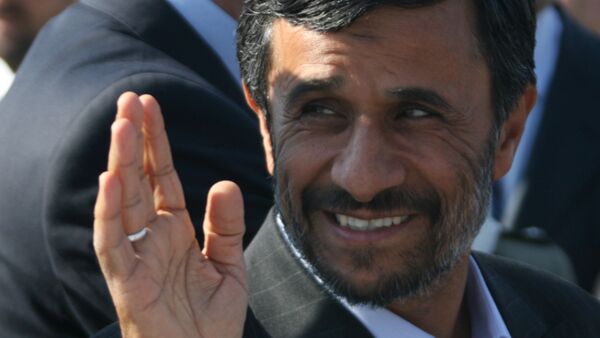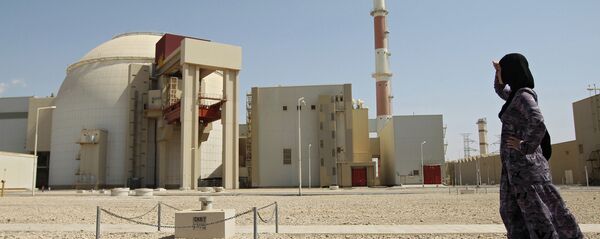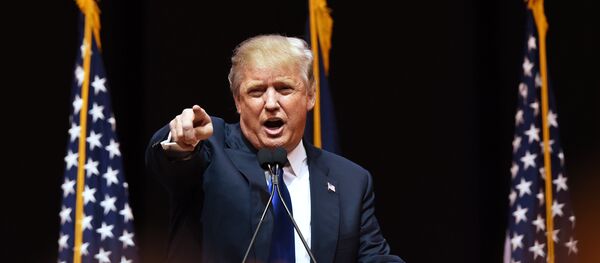In the early hours of Wednesday morning, Trump was officially declared the winner of the US presidential race. His victory, which most pundits and the majority of the mainstream media failed to predict, caused shockwaves around the globe, with speculation rife about the kinds of domestic and foreign policy he will pursue as president.
The Iranian leader, who served as president between 2005 and 2013, was condemned across the political spectrum in the US during his tenure, by Republicans, who loved using the misquoted line about Ahmadinejad wanting to 'wipe Israel off the face of the map', and Democrats, who had a good chuckle at his expense over the (again misquoted) remark about Iran 'having no gays'. In short, the Iranian president was a figure everyone could agree to hate.
The trend to compare him to Trump began in early 2016, when a few blogs and minor media networks published stories about Trump's populism and unpredictability making him 'America's Ahmadinejad' or someone who 'used Ahmadinejad's playbook.' These proved not to be critical enough, and in March The Telegraph released an article claiming that the Republican was actually "worse" than the former Iranian leader.
After Trump won the election, social media users, including some American-Iranians, and people who said they knew some Iranians, recalled the comparisons made months before.
Seeing a lot of this on social media —> A different Trump metaphor: America’s Ahmadinejad https://t.co/wfG6RcFPbj
— Sarah Parvini (@sarahparvini) November 10, 2016
Had a friend from Iran say Trump sounded identical to Ahmadinejad 10years ago. Thaaaat's unsettling. #yikes
— Scott H. (@fathead77) November 10, 2016
— Rob Jackson (@robjacksonnyc) November 10, 2016
— Negar نگار (@NegarMortazavi) November 9, 2016
— Adam N Weinstein (@AdamNoahWho) November 10, 2016
Sputnik Persian, conducting its own investigation of Iranian social media reactions to Trump, found that many users were similarly prone to making the comparison, but not for the same reasons that Western media was.
According to Iranians, just like Ahmadinejad, Trump had received the votes of ordinary people and the poor, instead of that of the elite or the middle class. Iranians agreed that both politicians are known for causing scandal, and for their populist tendencies.
#republican #Trump never be similar to the justice seeking #Ahmadinejad their only similarity is their #popularity #iraniansreacttotrump pic.twitter.com/jK3UFEJBs1
— Parisa Saranj (@parissasaranj) November 10, 2016
However, Iranian US expert Dr. Alireza Rezakhah says that the comparisons made by both sides are superficial.
Speaking to Sputnik Persian, the professor stressed that "when we want to compare two personalities, or draw a parallel between two people, it's necessary to first establish the criteria. Personally, as a person from academia, I strongly disagree with and oppose such a pseudo-analysis of the personalities of Trump and Ahmadinejad, because such a comparison has no scientific basis."
Explaining why the comparison is foolish, the professor recalled that "first of all, it must be said that the political past of the two men has nothing in common. Before becoming president, Ahmadinejad had been engaged in politics for a long time, and accumulated a great deal of experience. He was politically active from the time of the Islamic Revolution of 1979, and was involved in perhaps its most resonant episode – the capture of the US Embassy in Tehran. Ahmadinejad was then governor of Ardabil Province the mayor of Tehran, and ran for a seat in parliament."
Trump, on the other hand, only entered the realm of politics a year ago, via his presidential bid. "Even in the ranks of the Republican Party from which he ran, Trump was a stranger," Rezakhah noted. "Trump is a billionaire, not a politician. So this 'pseudo-comparison' publicized by The Guardian is little more than an attempt to divert public attention from the reality that exists in US society, and the Trump phenomenon itself."
Finally, the professor noted that even in their lifestyle and views, the two men are leagues apart. "The former Iranian president is not the owner of luxury villas or mansions, and lived in very modest circumstances similar to those of millions of ordinary Iranians. He continues to lead a very ascetic lifestyle. That is why Iranians gave him their votes, and why he is loved, and seen as the defender of the disadvantaged. It's difficult to imagine skyscraper owner Donald Trump being seen in such a light," Rezakhah concluded.
Ultimately, whether the comparison is valid or not, perhaps it will help in some way to tame any worsening in relations between Washington and Tehran once Trump takes office. Many Iranians are concerned that President Trump will attempt to revoke the Iran nuclear deal, and reactivate sanctions against the country.







